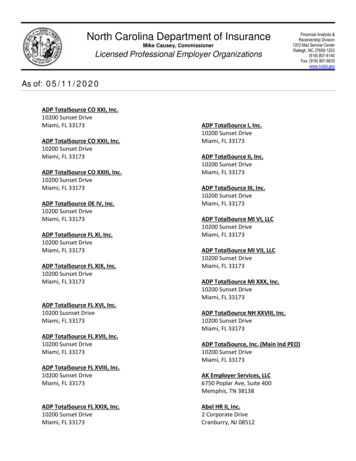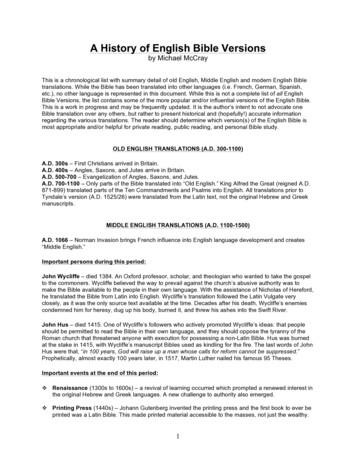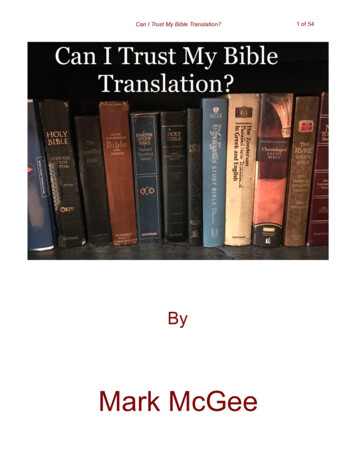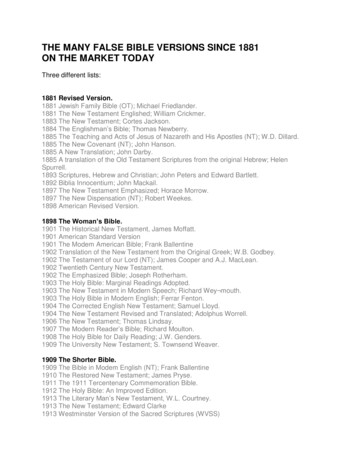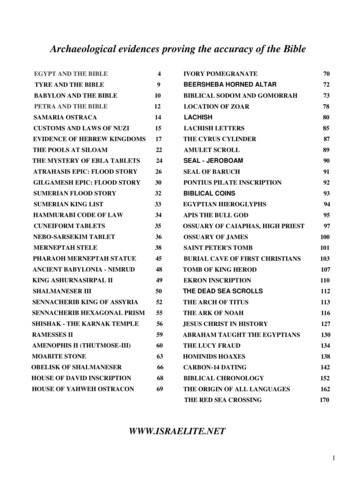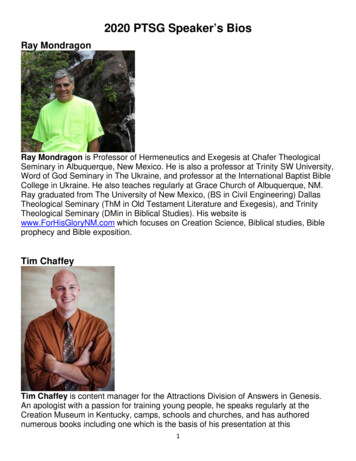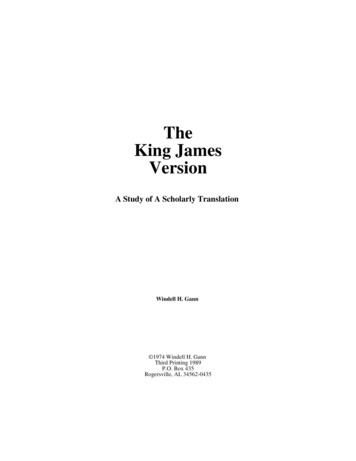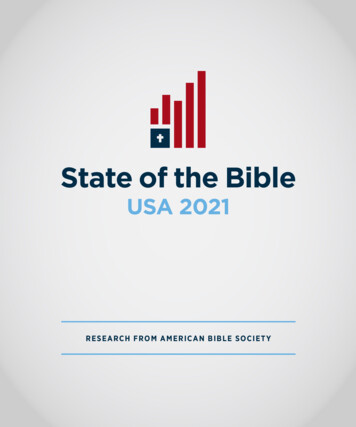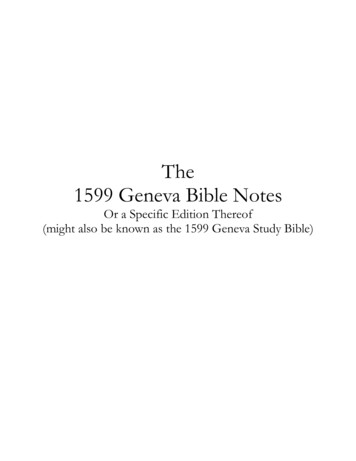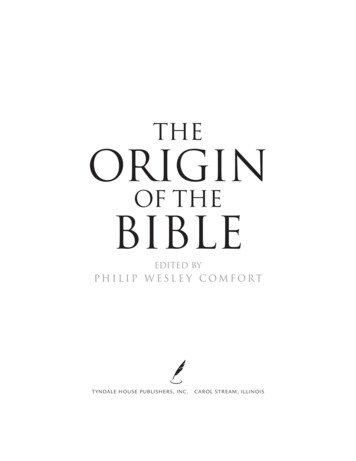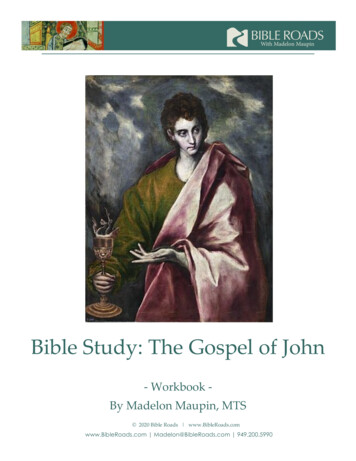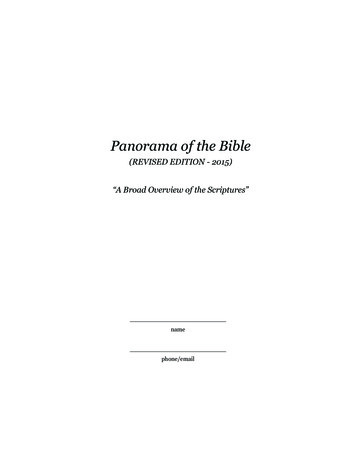
Transcription
Panorama of the Bible(REVISED EDITION - 2015)“A Broad Overview of the Scriptures”namephone/email
PrefaceThe reception to “Panorama of the Bible” has been humbling not only in the thousands whohave taken the class but in the hundreds that have viewed the series online. Since 1981,“Panorama” has undergone several revisions. This edition marks the latest (and perhapsthe last).As always, the value of “Panorama” is in its breadth and the attention to the PanoramaTimeline. The Timeline sequences key people, places, events, and dates in a chronological flow.It provides the skeletal framework for further (and deeper) studies.With this “Revised Edition – 2018”, it is the hope and prayer that believers will take seriously“the” Book – the divinely inspired revelation of God to His people. The prayer of the Psalmistis mine as well, “Open my eyes, that I may behold wondrous things out of your law”(Psalm 119:18 ESV).Robert V. CuppBiLD Training CenterWinter, 2015 2018, Fellowship Bible Church of Northwest ArkansasThe Training CenterScripture quotations are from The Holy Bible, English Standard Version (ESV ), copyright 2001 by Crossway, a publishing ministry of GoodNews Publishers. Used by permission. All rights reserved.Curriculum may be copied and used for personal and ministry purposesas long as content remains unchanged.fellowshipnwa.org/panorama
Table of ContentsPART ONE9Session 1 Prologue11Session 2 Patriarchs28Session 3 Redemption/Wanderings43Session 4 Conquest61Session 5 Apostasy80Session 6 Kingship: United Monarchy99PART TWO119Session 7 Kingship: Divided Monarchy121Session 8 Exile137Session 9 Return from Exile154Session 10 Life of Christ173Session 11 Church Age190Session 12 Final Consummation208
�Cunning”Jacob/Israel“5 Jericho”RahabRebellion“did not drive out”“Gilgal”EnterR R R“Judges 2”“Rest”, “Rebellion”,“Rest”, “Rebellion”,“Retribution”, “Repentance”,“Restoration”, “Rest”Major (6)Book of Ruth“Choose Today”Joshua’s Address.“Worship”Tabernacle Event“Noah”Flood“in the days of the judges”“Tribal Allotments”Possess“Moses Dies”“40 Years”(12 spies)“Central”“Southern” “Northern”ConquerPlains of Moab“Word”Sinai Event“Serpent”“Temptation”FallWanderingSin CycleMinor (6)APOSTASY (Judges, Ruth)Incomplete Conquest.“Salvation”“Passover”zzzzzzExodus Event.10 Plagues“Census”“Numbers hJoseph“Character”AND WANDERINGS (Numbers, Deuteronomy)MosesBondage#4 CONQUEST (Joshua).#3 REDEMPTION (Exodus, ngels#2 PATRIARCHS (Genesis 12-50; Job)“Psalm 90:2”“Genesis 1:1”God#1 PROLOGUE (Genesis 1-11)MovementsRRTIMELINER.“Nimrod”Tower.
“Wicked ��(Pss., Prov., Eccl., S. of S.)SolomonDeath ofSolomon931 BC.BabylonianDeportations605, 597, 586, 581 BCeg “Hezekiah”,“Manasseh”586 BCLength. 70 Years (Jer. 25, 29)Empires. Babylon, Medo-PersianProphets. Ezekiel & Daniel (Jeremiah)Exile722 BCAssyrian Captivity931 BC515 BC(516)Rebuildingthe Temple539 BCCyrus CapturesBabylon.“Death of Solomon”Babylonian Captivityeg. “Ahab”, “Joram”“The Prophets”ISRAELRehoboamJUDAH(Solomon’s Son)19 Kings1 Queen(most bad, some good)#8 EXILE (Ezekiel, Daniel).19 Kings(all bad)Jeroboam I#7 KINGSHIP: DIVIDED MONARCHY (1 Kings 12-22, 2 Kings).#6 KINGSHIP: UNITED MONARCHY (1-2 Samuel, 1 Kings 1-11).
Temptations“Satan”( 30)Hebrew IndependenceBaptismGreat Commission(Matt. 28)(1 Cor. 15)(Obscurity)3-4 yrs.(Popularity).(Opposition). . . (Between the osephZechariah#10 LIFE OF CHRIST (Gospels).(Zech. 9:9) (Jn. 13-17)Triumphal UpperRoomEntryHaggaiNehemiah. . . (End of Old Testament)Zechariah“Rebuild Temple”“Rebuild People”“Rebuild Walls”Malachi#9 RETURN 400 SILENT YEARS (Ezra, Nehemiah, Esther)Betrayal,.Arrest, Trials.
(Acts 1)(Acts 2)(Acts 2-7)(Acts 8-12).ISRAEL(OT)CHURCH(NT)(Acts 13-28)1000GreatWhiteThroneNewHeavens& EarthOR.Compare other views: Pre-millennial views (3 others) Amillennial Post-millennialTribulation(Pre-Trib / Pre-Mil View)ReturnEpistles 4)(15)(15-18)(18-21). . . ? . . .#12 FINAL CONSUMMATION (Revelation/Daniel)PaulMissionary Journey #1Jerusalem CouncilMissionary Journey #2Missionary Journey #3.WitnessingWitnessingWitnessinginininDay ofJerusalemJudea/SamariaRemotest PartsPentecostTransitionChurch Age Begins:#11 CHURCH AGE (Acts, Epistles)EternityPaul in Rome.(Acts 28)
PART ONEPanorama of the Bible(REVISED EDITION - 2015)“A Broad Overview of the Scriptures”Movements #1-6
Panorama of the Bible, Revised Edition Session 1 Page 11Session 1I.PRAYER/PURPOSEHow To Maximize the Greatest Value of “Panorama”1. Attend all 12 sessions; do as many of the readings as you can.2. Focus on the mastery of the “Timeline”; it is the key to this study.3. Teach another person the basic “Timeline” each week. This suggested assignmentwill reinforce and establish your understanding of the Bible’s basic flow(i.e. the “Timeline”).4. Review the material as often as you can. Let the “Timeline” become your skeletalframework for a lifetime of studying the Scriptures.II. ARCHITECTURE OF THE ENGLISH BIBLEA. Old TestamentOLD TESTAMENT - 39NARRATIVE - 17POETRY - 5Torah (5)History (12)ExperienceMajor (5)WisdomMinor (12)PROPHECY - 17
Page 12 Session 1 Panorama of the Bible, Revised EditionB. New TestamentNEW TESTAMENT - 27NARRATIVE - 5APOCALYPTIC - 1EPISTOLARY - 21Gospels (4)Pauline (13)Revelation (1)Acts (1)General (8)(Daniel)III. TWELVE MOVEMENTS THROUGH THE BIBLEPANORAMA: TWELVE MOVEMENTSMovementBiblical Books#1 PrologueGenesis 1-11#2 PatriarchsGenesis 12-50; Job#3 Redemption and WanderingsExodus, Leviticus, Numbers, Deuteronomy#4 ConquestJoshua#5 ApostasyJudges, Ruth#6 Kingship: United Monarchy1-2 Samuel; 1 Kings 1-11(Pss., Prov., Eccl., Song of Solomon)#7 Kingship: Divided Monarchy1 Kings 12-22; 2 Kings (Prophets - selected)#8 ExileDaniel, Ezekiel (Jeremiah)#9 Return from Exile and 400 Silent YearsEzra, Nehemiah, Esther(Haggai, Zechariah, Malachi)#10 Life of ChristMatthew, Mark, Luke, John#11 Church AgeActs and Epistles#12 Final ConsummationRevelation (Daniel)
Panorama of the Bible, Revised Edition Session 1 Page 13IV. MAP BOARD: “THE LAND”
Page 14 Session 1 Panorama of the Bible, Revised EditionV. MOVEMENT #1 (of 12): “PROLOGUE” OVERVIEWA. Broad Context: “Book of Genesis”The Book of GenesisPrimeval HistoryPatriarchal HistoryMajor EventsMajor Persons1. Creation2. Fall3. Flood4. Tower1. Abram/Abraham2. Isaac3. Jacob/Israel4. Joseph1111250B. Narrow Context: “Genesis 1-11”CREATION1FALL2 3FLOOD4 456TOWER9 10Genealogies“GUAM”- God- Universe- Angels- Man1111
Panorama of the Bible, Revised Edition Session 1 Page 15C. Panorama Timeline: “Prologue: Movement #1”1. Short (Nimrod)2. Expanded VersionGodUniverse AngelsManFallFloodTower“GUAM” CreationVI. “PROLOGUE” TIMELINE/EXPOSITIONA. GodA.W. Tozer, Knowledge of the Holy:a. “What comes into our minds when we think about God is themost important thing about us.”b. “.the mightiest thought that the mind can entertain is thethought of God.”
Page 16 Session 1 Panorama of the Bible, Revised Edition1. Amos 4:13 (NASB)For behold, He who forms mountains and creates the wind and declares to man whatare His thoughts, He who makes dawn into darkness and treads on the high places ofthe earth, the Lord God of hosts is His name.2. Psalm 90:2Before the mountains were brought forth, or ever you had formed the earth and theworld, from everlasting to everlasting you are God.(No Time Restraints)3. 1 Kings 8:27But will God indeed dwell on the earth? Behold, heaven and the highest heaven cannotcontain you; how much less is this house that I have built!(No Spatial Restraints)4. Psalm 147:5 (NIV)Great is our Lord and mighty in power; his understanding has no limit.(No Knowledge Restraints)5. Jeremiah 51:15It is he who made the earth by his power, who established the world by his wisdom, andby his understanding stretched out the heavens.(No Power Restraints)
Panorama of the Bible, Revised Edition Session 1 Page 17Classical Arguments for the Existence of God1) Cosmological: creation is the “effect”; God is the sufficient “cause” (Ps. 19:1).2) Teleological: creation is the “watch” (or design); God is the “watchmaker”(or designer) (Rom. 1:18-20).3) Moral: Man has moral law imprinted by creation; God is the MoralLaw-Giver who gave it.4) Ontological: man conceives of a Greatest Conceivable Being (GCB). ThisGCB must exist (since existence is a property of a GCB).N.B. These arguments (and others) do not prove the existence of God, only thereasonableness of faith in God (see Heb.11:3 and the role of “faith”).B. Universe1. Genesis 1:1In the beginning, God created the heavens and the earth.2. Revelation 4:11Worthy are you, our Lord and God, to receive glory and honor and power, for youcreated all things, and by your will they existed and were created.
Page 18 Session 1 Panorama of the Bible, Revised EditionTheories of Creation1. Atheistic Evolution: no creation, matter is eternal (always was,always will be).2. Theistic Evolution: God created and then let evolutionaryprocesses take over.3. Day-age Creationism (old earth): God created the earth overvast epochs (Heb. yom) of time.4. 24-Hour Creationism (young earth): God created the earthin 6 literal, 24-hour days (Heb. yom).5. Historical (Textual) Creationism: God created all (Gen 1:1) andin an indeterminate length of time later fashionedthe “land” for habitation (in six days – Gen. 1).C. Angels1. Fact of their creationa. Psalm 148: 1-2, 5Praise the Lord! Praise the Lord from the heavens; praise him in the heights!2Praise him, all his angels; praise him, all his hosts!b. Colossians 1:16For by him all things were created, in heaven and on earth, visible and invisible,whether thrones or dominions or rulers or authorities—all things were createdthrough him and for him.
Panorama of the Bible, Revised Edition Session 1 Page 192. Time of their creationa. Uncertainb. Presence at creationJob 38:4-7 (Col. 1:16)Where were you when I laid the foundation of the earth? Tell me, if you haveunderstanding. 5 Who determined its measurements—surely you know! Or whostretched the line upon it? 6 On what were its bases sunk, or who laid itscornerstone, 7 when the morning stars sang together and all the sons of Godshouted for joy?3. “Fall” (rebellion) from creationa. Fall of Lucifer(Isa. 14:12-14; Ezek. 28:12-19)b. Fall of rebellious angelsMatthew 25:41Then he will say to those on his left, “Depart from me, you cursed, into the eternalfire prepared for the devil and his angels.”Jude 1:6And the angels who did not stay within their own position of authority, but lefttheir proper dwelling, he has kept in eternal chains under gloomy darkess untilthe judgment of the great day.c. Fundamental question generated by Satan’s rebellion(and that of the fallen angels):“Who has the right to rule?”
Page 20 Session 1 Panorama of the Bible, Revised EditionJ. Dwight Pentecost (Things to Come, 431-432):“Satan’s original sin was an act of rebellion against the constituted authorityof God and was motivated by a covetous desire to appropriate that verysovereignty for himself. Because of this sin, which brought about the fall ofSatan, a kingdom over which Satan rules was formed in opposition to thekingdom over which God ruled. Satan is pictured as the god of this age(2 Cor. 4:4), and the possessor of the kingdoms of the world. (Matt. 4:8-9).”d. Matthew 25:34Then the King will say to those on his right, “Come, you who are blessed by myFather, inherit the kingdom prepared for you from the foundation of the world.” Kingdom - over which God rules Kingdom - over which Satan rules (darkness) Kingdom - over which Messiah rules (Davidic)D. Man1. “The Image of God” (Imago Dei)a. Genesis 1:26Then God said, “Let us make man in our image, after our likeness. And let themhave dominion over the fish of the sea and over the birds of the heavens and overthe livestock and over all the earth and over every creeping thing that creeps onthe earth.b. Genesis 1:27So God created man in his own image, in the image of God he created him; maleand female he created them.c. Genesis 1:28And God blessed them. And God said to them, “Be fruitful and multiply and fill theearth and subdue it, and have dominion over the fish of the sea and over the birdsof the heavens and over every living thing that moves on the earth.”
Panorama of the Bible, Revised Edition Session 1 Page 21The Image of God (Imago Dei)Three Primary Views:1) Ontological (Being) View:Man is like God in certain ways. personal, intelligent,emotive, relational, moral, so forth (“in” the image of God).2) Functional View:Man is the representative of God; man is the viceroy oradministrator over creation, representing God’s authority(“as” the image of G0d).3) Combination View:Man is both “in” and serves “as” the image of God.“The fact that man is in the image of God means that man is like God andrepresents God.”(Wayne Grudem, Systematic Theology, 442)2. Essential nature of man(Physical and non-physical)a. Genesis 2:7 (NASB)Then the Lord God formed man of dust from the ground, and breathed into hisnostrils the breath of life; and man became a living being.b. 2 Corinthians 4:16 (NASB)Therefore we do not lose heart, but though our outer man is decaying, yet ourinner man is being renewed day by day.Insight:Theologians generally agree that man has a material (physical) andimmaterial (non-physical) nature. Some theologians futher divide theimmaterial into soul and spirit (cf. 1 Thess. 5:23; Heb. 4:12). These viewsare called dichotomy (2 parts) and trichotomy (3 parts).
Page 22 Session 1 Panorama of the Bible, Revised Edition3. Theological summaryJob 33:4 (NASB)The Spirit of God has made me, and the breath of the Almighty gives me life.PANORAMA TIMELINE: UPDATE“Prologue” (Movement #1)GodUniverseAngelsMan(“GUAM” Creation)E. Fall1. Definition of “Fall”:“The event in which Adam and Eve, the first humans, disobeyed the explicit command ofGod, thereby bringing sin and death onto the human race. As a consequence of the fall,humans have become alienated from God, from one another and from the created order.”(Grenz, Guretzki, and Nordling, Pocket Dictionary of Theological Terms, 5o)2. Biblical accounta. The TempterGenesis 3:1aNow the serpent was more crafty than any other beast of the field that the LordGod had made.
Panorama of the Bible, Revised Edition Session 1 Page 23b. The TemptationGenesis 3:1b-5He said to the woman, “Did God actually say, ‘You shall not eat of any tree in thegarden’?” 2 And the woman said to the serpent, “We may eat of the fruit of the treesin the garden, 3 but God said, ‘You shall not eat of the fruit of the tree that is in themidst of the garden, neither shall you touch it, lest you die.’” 4 But the serpent saidto the woman, “You will not surely die. 5 For God knows that when you eat of ityour eyes will be opened, and you will be like God, knowing good and evil.”The Tempting Speech of the Serpent (Satan)1. “Did God actually say. ?” (3:1) . DOUBT2. “You will not surely die” (3:4) . DENIAL3. “You will be like God” (3:5) . DECEPTIONc. The TacticGenesis 3:6So when the woman saw that the tree was good for food, and that it was a delightto the eyes, and that the tree was to be desired to make one wise.Temptation Strategy1. “Good for food”: appeals to the physical (“lust of the flesh”)2. “Delight to the eyes”: appeals to the aesthetic (“lust of the eyes”)3. “Desired to make one wise”: appeals to the intellectual (“pride of life”)1 John 2:16 (NASB)For all that is in the world, the lust of the flesh and the lust of the eyesand the boastful pride of life, is not from the Father, but is from theworld.
Page 24 Session 1 Panorama of the Bible, Revised Editiond. The TragedyGenesis 3:6b-7.she took of its fruit and ate, and she also gave some to her husband who waswith her, and he ate. 7 Then the eyes of both were opened, and they knew that theywere naked. And they sewed fig leaves together and made themselves loincloths.e. The theological result(1) Spiritual deathIsaiah 59:2But your iniquities have made a separation between you and your God, andyour sins have hidden his face from you so that he does not hear.Romans 5:18Therefore, as one trespass led to condemnation for all men, so one act ofrighteousness leads to justification and life for all men.(2) Judgment (Gen. 3:14-19)(a) On the serpent (14-15)(b) On the woman (16)(c) On the man (17-19)(3) Spread of sin (Gen. 4 ff)For Further Study:With respect to the creation of man (anthropology) and the fall of man(hamartiology), take the Baseline class, “We Believe: Survey of Theology.”To study Genesis 3 in more depth, take the class “Panorama Plus 1”(Gen 1-11). Both are available on the BiLD website:bild.fellowshipnwa.org
Panorama of the Bible, Revised Edition Session 1 Page 25F. Flood1. The Biblical account: Described: Genesis 6-8 Post-Flood: Genesis 92. The sin condition: before the FloodGenesis 6:5The Lord saw that the wickedness of man was great in the earth, and that everyintention of the thoughts of his heart was only evil continually.3. The sin judgment: before the FloodGenesis 6:6-7And the Lord regretted that he had made man on the earth, and it grieved him to hisheart. 7 So the Lord said, “I will blot out man whom I have created from the face of theland, man and animals and creeping things and birds of the heavens, for I am sorry thatI have made them.”4. The Flood account summarized:a. Enter the ark (Gen.7:1-8:14)Genesis 7:1Then the Lord said to Noah, “Go into the ark, you and all your household, for Ihave seen that you are righteous before me in this generation.”b. Leave the ark (Gen.8:15-22)Genesis 8:15-17Then God said to Noah, 16 “Go out from the ark, you and your wife, and your sonsand your sons’ wives with you. 17 Bring out with you every living thing that is withyou of all flesh—birds and animals and every creeping thing that creeps on theearth—that they may swarm on the earth, and be fruitful and multiply on the earth.”Genesis 8:20aThen Noah built an altar to the Lord
Page 26 Session 1 Panorama of the Bible, Revised EditionG. Tower1. Recall the commandGenesis 1:28And God blessed them. And God said to them, “Be fruitful and multiply and fill the earthand subdue it, and have dominion over the fish of the sea and over the birds of theheavens and over every living thing that moves on the earth.”(Before the Fall)Genesis 9:1And God blessed Noah and his sons and said to them, “Be fruitful and multiply and fillthe earth.”(After the Flood)2. Record of the disobedienceGenesis 11:1-4Now the whole earth had one language and the same words. 2 And as people migratedfrom the east, they found a plain in the land of Shinar and settled there. 3 And they saidto one another, “Come, let us make bricks, and burn them thoroughly.” And theyhad brick for stone, and bitumen for mortar. 4 Then they said, “Come, let us buildourselves a city and a tower with its top in the heavens, and let us make a name forourselves, lest we be dispersed over the face of the whole earth.”3. Response to the rebellionGenesis 11:5-7And the Lord came down to see the city and the tower, which the children of manhad built. 6 And the Lord said, “Behold, they are one people, and they have all onelanguage, and this is only the beginning of what they will do. And nothing that theypropose to do will now be impossible for them. 7 Come, let us go down and there confusetheir language, so that they may not understand one another’s speech.”Theological Question:“Who has the right to rule?”
Panorama of the Bible, Revised Edition Session 1 Page 27VII. TIMELINE: “PROLOGUE” (MOVEMENT #1)“Prologue”: Simple )(Nimrod)“Prologue”: Expanded TimelineGodUniverse AngelsManFallFloodTower“GUAM” CreationVIII. FOR SESSION 2: “PATRIARCHS”A. Minimal Reading: Genesis 12, 15, 17B. Maximum Reading: Genesis 12-24C. Personal Project: Take a person through the “Timeline” for this session.Draw and explain it as best you can.
Page 28 Session 2 Panorama of the Bible, Revised EditionSession 2I.PRAYER/REVIEW (“PROLOGUE” TIMELINE)GodUniverse AngelsManFallFloodTower“GUAM” CreationII. MOVEMENT #2 (of 12): “PATRIARCHS” OVERVIEWA. Broad Context: “Book of Genesis”The Book of GenesisPrimeval HistoryPatriarchal HistoryMajor EventsMajor Persons1. Creation2. Fall3. Flood4. Tower1. Abram/Abraham2. Isaac3. Jacob/Israel4. Joseph1111250B. Narrow Context: “Genesis 12-50”Abraham12Isaac2525Jacob26 27Joseph363750
Panorama of the Bible, Revised Edition Session 2 Page 29C. Panorama Timeline: “Patriarchs”: Movement eph(Ishmael)(Esau)(11 Brothers)III. “PATRIARCHS”: TIMELINE/EXPOSITIONA. Abram (Abraham)1. Abraham’s Characterization:Abraham: Man of “Faith”1. Trusted God and departed to the“Promised Land” (Gen. 12:1-5)2. Trusted God’s word and built an altarof worship (Gen. 12:7-8)3. Trusted God’s care and offered nephew,Lot, a choice of land (Gen. 13:8-9)4. Trusted God’s promise of special,promised land (Gen. 13:14-18)5. Trusted God’s protection and rescuedLot (Gen. 14:13-16)6. Trusted God’s provision for life andGod counted (credited, reckoned) it asrighteousness (Gen. 15:6)Genesis 15:67. Trusted God’s promise and receivedthe sign (rite) of circumcision(Gen. 17:3-14)8. Trusted God’s word for an heir (son) to thecovenant with God (Gen. 17:17-24)9. Trusted God’s mercy and prayed for 10righteous men of Sodom and Gomorrah(Gen. 18:16-33)10. Trusted God’s healing and prayed forAbimelech’s wife and slave girls(Gen. 20:17)11. Trusted God’s promise and was willing tosacrifice Isaac (Gen. 22:1-19; Heb. 11:17-19)12. Trusted God’s provision of a wife for hisson, Isaac (Gen. 24)And he believed the Lord, and he counted it to him as righteousness.
Page 30 Session 2 Panorama of the Bible, Revised Edition2. Abram’s (Abraham’s) Calla. Genesis 12:1-3Now the Lord said to Abram, “Go from your country and your kindred and yourfather’s house to the land that I will show you. 2 And I will make of you a greatnation, and I will bless you and make your name great, so that you will be ablessing. 3 I will bless those who bless you, and him who dishonors you I will curse,and in you all the families of the earth shall be blessed.”(1) Grammatical insight:Two imperatives:(a) Go (leave)!(b) Be a blessing!Three promises (each imperative):(a) Go. “I will make of you a great nation” (2) “I will bless you” (2) “(I will) make your name great” (2)(b)Be a blessing. “I will bless those who bless you” (3) “Who dishonors you I will curse” (3) “In you all the families of the earth will be blessed” (3)Theological Insight:“In you (i.e. your descendants, in particular one specialdescendant – Christ) shall all the nations (Gentiles) be blessed(untimately in salvation accomplished by Christ).
Panorama of the Bible, Revised Edition Session 2 Page 31(2) Practical insight: the “risk” element of faithWhat is God asking Abram to do? Leave his land/country Leave his people (Sarai is barren) Leave his inheritanceFor what? .yet unseen promisesInsight:What a person gives up to follow God’s direction will beabundantly restored. (cf. Luke 18:29-30)3. Abram’s (Abraham’s) Covenanta. Review the call/promiseGenesis 12:1-3Now the Lord said to Abram, “Go from your country and your kindred andyour father’s house to the land that I will show you. 2 And I will make of youa great nation, and I will bless you and make your name great, so that youwill be a blessing. 3 I will bless those who bless you, and him who dishonorsyou I will curse, and in you all the families of the earth shall be blessed.”b. Covenant promise: chartedAbrahamic CovenantDavidic CovenantNew CovenantDeut. 30:1-82 Sam 7:12-16Jer. 31:31-34
Page 32 Session 2 Panorama of the Bible, Revised Editionc. Covenant questionIs the Abrahamic covenant. conditional? (if. then) unconditional? (I will)4. Abraham’s Test of Faitha. Previous tests(1) Leaving his home and family (Gen. 12:11)(2) Separating from his nephew, Lot (Gen. 13:8-9)(3) Sending away his son, Ishmael (Gen. 21:8-13)b. Defining testGenesis 22:1-2After these things God tested Abraham and said to him, “Abraham!” And he said,“Here I am.” 2 He said, “Take your son, your only son Isaac, whom you love, andgo to the land of Moriah, and offer him there as a burnt offering on one of themountains of which I shall tell you.”(1) Hebrew imperatives: “Take” “Go” “Offer” (sacrifice)(2) This is a test (not temptation) to try and prove the strength of Abraham’strust/faith in God.James 1:2-4Count it all joy, my brothers, when you meet trials of various kinds, 3 for youknow that the testing of your faith produces steadfastness. 4 And letsteadfastness have its full effect, that you may be perfect and complete,lacking in nothing.James 1:13Let no one say when he is tempted, “I am being tempted by God,” for Godcannot be tempted with evil, and he himself tempts no one.
Panorama of the Bible, Revised Edition Session 2 Page 33c. Defining responseGenesis 22:4-5On the third day Abraham looked up and saw the place in the distance. 5 He said tohis servants, “Stay here with the donkey while I and the boy go over there. We willworship and then we will come back to you.” “We will worship”/“We will come back”Hebrews 11:17-19By faith Abraham, when he was tested, offered up Isaac, and he who had receivedthe promises was in the act of offering up his only son, 18 of whom it was said,“Through Isaac shall your offspring be named.” 19 He considered that God wasable even to raise him from the dead, from which, figuratively speaking, he didreceive him back.5. Abraham’s deatha. Recorded: Genesis 25:7-8b. Age at death: 175 yearsB. Isaac1. Isaac’s characterization: For example, see Genesis 26:17-22; 26:28-312. The blessing of GodGenesis 25:11After the death of Abraham, God blessed Isaac his son. And Isaac settled atBeer-lahai-roi.3. The reaffirmation of the Abrahamic CovenantGenesis 26:2-4And the Lord appeared to him and said, “Do not go down to Egypt; dwell in the landof which I shall tell you. 3 Sojourn in this land, and I will be with you and will blessyou, for to you and to your offspring I will give all these lands, and I will establish theoath (covenant promise) that I swore to Abraham your father. 4 I will multiply youroffspring as the stars of heaven and will give to your offspring all these lands. And inyour offspring all the nations of the earth shall be blessed.”
Page 34 Session 2 Panorama of the Bible, Revised Edition4. The twin sons of Isaac JacobEsauIsraelitesEdomites5. The death of Isaaca. Recorded: Genesis 35:28-29b. Age at death: 180 yearsC. Jacob (Israel)1. Jacob’s characterization:JACOB: MAN OF “DECEPTION”(refer to Jer. 9:3-11. deception)1. Jacob played on his brother’s weakness for immediate physical and sensualgratification; Esau sold his birthright to Jacob for a bowl of stew. (Gen. 25:21-34)2. Jacob (with his mother’s help) tricked his father (Isaac) into believing that he was hisbrother (Esau); Jacob received his father’s unalterable, binding blessing. (Gen. 27:1-40)3. Jacob left his father and mother to seek out a wife from Rebekah’s family; Rebekahused a deceptive excuse to get Jacob away from his angry, vengeful brother, Esau.(Gen. 27:41-46)4. Jacob was deceived by his father-in-law, Laban; he received Leah (not Rachel) for hiswife. family trait of deception? (Gen. 29:14-30)5. Jacob made an agreement with Laban concerning personal ownership of the numeroussheep of their joint flock; further, Jacob attempted (superstitiously) to influence thebirth of spotted, dark sheep through ingenious, devious means. (Gen. 30:25-43)6. Jacob, in fear of Laban’s sons and Laban himself, deceived his father-in-law andsecretly ran away with his wives and all that he had accumulated. (Gen. 31:1-21;especially v.20; cf. 31:25-30)7. Jacob’s wife, Rachel, stole the family gods of Laban. family trait of deception?(Gen. 31:31-32)
Panorama of the Bible, Revised Edition Session 2 Page 352. The reaffirmation of the Abrahamic CovenantGenesis 28:10-15Jacob left Beersheba and went toward Haran. 11 And he came to a certain place andstayed there that night, because the sun had set. Taking one of the stones of the place,he put it under his head and lay down in that place to sleep. 12 And he dreamed, and behold,there was a ladder set up on the earth, and the top of it reached to heaven. And behold,the angels of God were ascending and descending on it! 13 And behold, the Lord stoodabove it and said, “I am the Lord, the God of Abraham your father and the God ofIsaac. The land on which you lie I will give to you and to your offspring. 14 Youroffspring shall be like the dust of the earth, and you shall spread abroad to the westand to the east and to the north and to the south, and in you and your offspring shallall the families of the earth be blessed. 15 Behold, I am with you and will keep youwherever you go, and will bring you back to this land. For I will not leave you until Ihave done what I have promised you.”3. The defining momenta. Jacob had stolen his br
will reinforce and establish your understanding of the Bible’s basic flow (i.e. the “Timeline”). 4. Review the material as often as you can. Let the “Timeline” become your skeletal framework for a lifetime of studying the Scriptures. II. ARCHITECTURE OF THE ENGLISH BIBLE A. Old T
